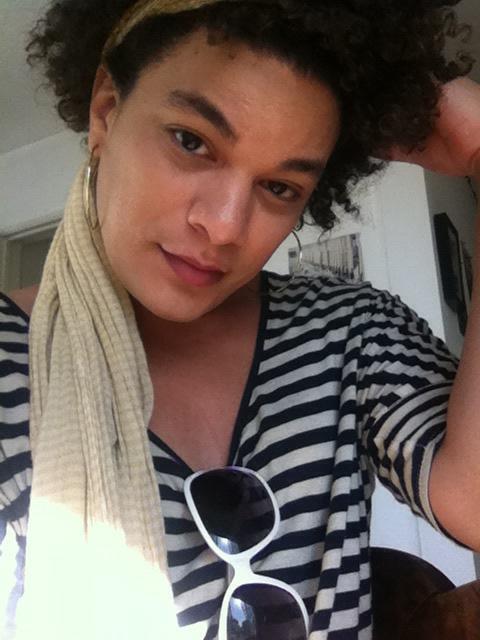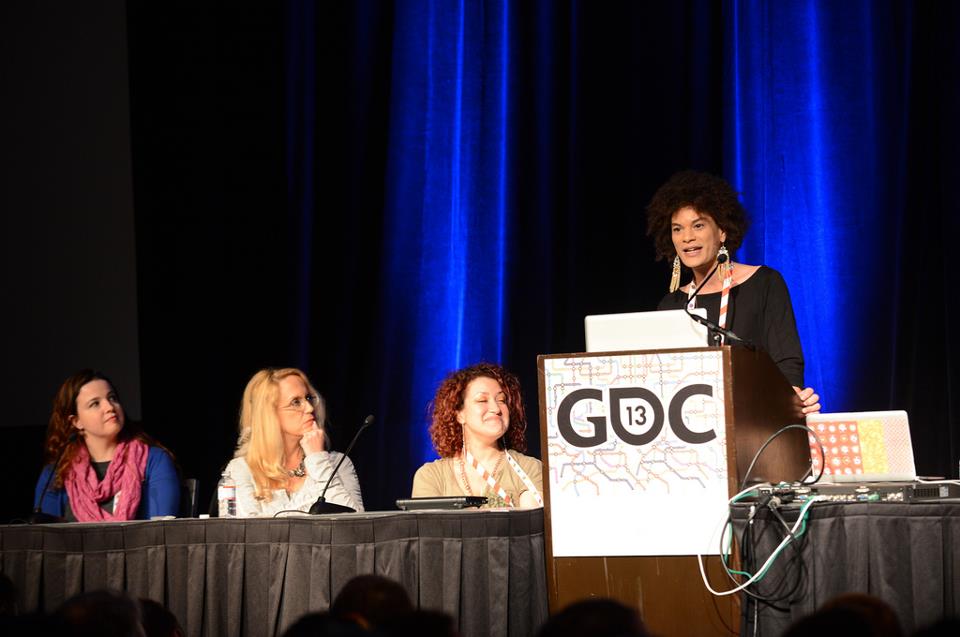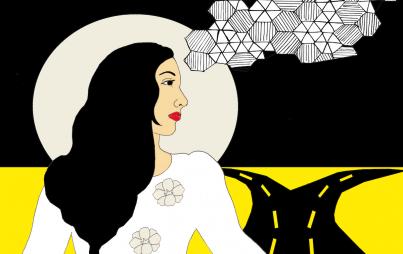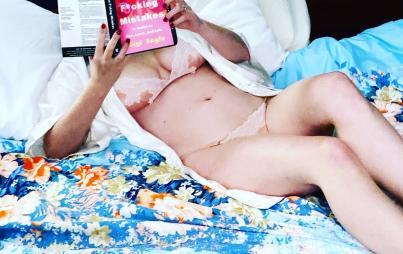
Lavish your adoration onto my friends, the rad lady and gender non-conforming folk who make up the resistance against #Gamergate. Check out my other interviews, with Leigh Alexander, Soha Kareem, Aevee Bee and Toni Rocca, by clicking on the little purple words.
“Mattie is just so hot—”
“I know, right!? I keep hoping she’ll give girls a try.”
My girlfriend and I are in bed. A tangled debacle of dyed hair now enjoined in communal swoon. Mattie Brice brings the pubescent high school crush to your lazy late morning love-a-thon.
When my brother first touched upon that renowned knee-jerk overreaction of tumblr activists, I showed him Mattie's "On Anger." I hoped her fluent and fearless eloquence would be enough to sway him over to "my side"—the side of justice! I've looked to her writing to inform inklings.
There is this special hell, an affliction of "getting warmer" politics, where you know you're right but you don't know why you're right, because capitalism and white supremacy obfuscate any language that can be used to criticize it. Mattie's writing, including but not limited to this excellent treatise on intersectionality in games criticism, helps pull me from the flames of that singular misery—though no corner of the world is dark and deep enough to spare you from her blithe and blistering attractiveness.
The day I met Mattie, I dragged a box of sharpies out into my living room and rummaged through them for the right shade, width and degree of shine to adequately ascertain and convey her ineffable opulence, in the form of an autograph onto the Playstation 3 I had just bought from her.
I had the thing for a year and never plugged it in.
I guess the time I got to spend with her—playing Netrunner, musing on consent through mouthfuls of grade D pizza—became more valuable to me than the proof that I once got to meet someone who wrote things really important to my identity and navigation as an activist in games spaces. Or maybe the tireless deluge of runoff from white male gamers’ toxic entitlement she has received effectively allayed the allure of owning a console. I want to have as little in common with the sort of people who do not see Mattie Brice as a national fucking treasure as I can.
Mattie is a diamond, she's a laser, she's a star—and every shitty twitter comment pushes women out like her who make games a healing and transformative space.
I’m encumbered: The day after I met Mattie outside of Arbor Cafe in Oakland and treated myself to the company of a woman whose bold and remorseless radiance has indisputably beautified my life, as a friend and a fellow games writer, she was pressured to step down as a judge for the International Games Festival amidst harassment. She has since intimated a desire to leave games entirely.
Mattie made games—made play—safer. Through criticism. Through exploration, education and the occasional fearless 2 AM selfie. As more women of color are forced out of games through threat of death, I'm left to wonder if games are even worth saving.
I've tried, in the past, to turn the other cheek and accentuate the positive—but with every tricked-out "triumph of the human spirit in the face of adversity," there's uncountable collateral damage.
There is a compulsion to “come back” at this harassment—harder, angrier, vexatious with venom—but I don’t know if that really honors the joy and smug peacefulness my friendship with Mattie, and the spaces we’ve created together, has brought me.
Instead I will settle for giving her the space she deserves, the space others keep trying to take, shutting out the shakedown until there is only play. Just as I had seen her do on so many a Sunday afternoon.
You started out as a food critic, or rather, wanting to be one. And who wouldn’t want to be paid to eat food? I think a lot of what is happening right now in the current landscape of games is trying to preserve this idea, this hope against hope, that you can still make a lot of money doing fun shit like playing video games for a living.
I just think it’s so interesting because the moment I started to get into games criticism, you know, I also tried to figure out what games journalism was like, and I found out how really dystopic it was.
Not only is it really, really difficult to get a lot of money from game reviews, it’s hard to do it period. It’s hard to even do it poorly, to even get scraps for it. It was just really absurd, and the fact that everyone acknowledges that “yes this is hard,” but they never really said “yes, this is nearly impossible, yes this is probably not worth it, don’t do it unless you really really really have everything else set up in your life and you want to make a casual move in your spare time over to games.” Which is why I would advise people to—actually, I would advise that nobody go into games journalism right now.
But let’s pretend that things are ethical and there are not large droves of harassment—I would say “okay, um, if your plan A is to be a games journalist, go for your plan B first. Make sure your plan B is rock solid and start going in your free time, do games journalism and one day you might possibly do something as a games journalist. But don’t count on it.”
Is there anything games journalists can learn from having to review food?
What’s really interesting about food criticism is that it’s an experience you literally take into your body. It’s something I criticize a lot about game design—this idea that you just treat players like they’re a pair of eyeballs and fingers and a brain and that’s it. There are all these other parts of our body that are being ignored. So, food criticism, you know, in a way, some people complain about playing or having to review a game they don’t like—well, imagine eating a meal you don’t like, and not knowing if that meal is actually going to be good or bad until it comes to you.
I’m emotionally tied to food, as I’m sure a lot of people are, and it can shift how your mind feels, your memories—your day is really affected by it. And also, you have to feel weird if you’re going to a bougie place—I do a good job of bouge-passing because a lot of my youth was spent trying to pass as someone who is upper-middle class, so I’m OK in doing that, but there’s a whole other set of issues. You’re a gentrifier in that space.
As a game reviewer, you’re kind of setting your own context for whatever you want, which I think is a luxury.
In most other forms of criticism, like food, you are explicitly discouraged from having a persona, whereas in games journalism it is absolutely necessary for mainstream success. I guess this is why a lot of queers fall into games and games writing—we've had a lot of practice in "persona."
I’m one of those people that, when I need to do a lot of life changes, I do them all at once. I think this is a trend for a lot of queer people actually, you know, the binge and purge. Whenever I talk about when I was younger and I used to binge and purge on clothes, especially on certain types of clothes when I started to actively have a more femme appearance, I find that other people have that similar relationship to clothing.
I feel I have that relationship to life where I’ll set a date where everything in my life changes. Starting a games blog was one of those days. No one had ever seen my hair straightened. And that was a really big, important thing for me, because there’s a lot of politics and self-angst with natural hair, when you’re read as black, basically. And I had a lot of internalized racism that I’d been dealing with for a very long time and I had felt uglier with my natural hair, a common thing with black women and their hair—for me, it meant a lot to come into a space where no one knows that my hair was straightened, ever, and it also was the first time I got to craft a thing where people didn’t see one side of my life and then a transition into another, people just saw me as I want to present myself.
I think the persona crafting is really interesting because it was the first time where I actually, for a mass audience, had a very specific way I got to present myself, and I got to do it well, and three or so years later, I now think I might have done a couple things differently. But here we are, and that’s how it goes.
When I first became aware of you on social media, I thought you were a fashion writer. Your outfits are always really good—your poses, too. You’re trying to form an identity in queer space and the strength of your fashion, I feel, is you don’t dress queer in the sense that you don’t follow this very white aesthetic (the undercuts and the doc martens, etc.).
For me, as a lot of people say, fashion is a weapon, if you will. Fashion is a way I make people come on my terms of how they’re going to interact with me, that’s how I see fashion and appearance very often. And because maybe I have a less queer look, in that way, I think I’m visually read as not queer very often.
I kind of worry that I’m not punk enough—I think about it that a lot, too. It’s weird because I’ve been trying to craft clothes that make me feel confident. That’s what fashion is for. It’s for self-expression and self-confidence and if we are going to deconstruct fashion in a way to de-class it, it would be to also value clothes that don’t require you to have money.
Something that I really liked about that interview with Aevee is her talking about “women doing women badly," and in a way I am very aware that I’m doing queer woman badly. I know I‘m not being a good, complacent, cis-passing woman. I’m not doing that very well, because I talk about sex in public, and I talk about dominating men very openly and fervently.
There’s an expectation that everyone in games secretly want to be game makers and everything we do is about getting feet in doors until we can make games. But you started out wanting to be a mystery writer. Do you see your affinity for creating and exploring glitches in games overlapping with your previous desire to create puzzles of narrative?
There's this idea: how do we incorporate glitches into design processes? I see queerness as a glitch, in a way. Just to draw an analogy, a glitch is basically an unintended effect of a program you have purposely made. It is what would be coded as a mistake that produces glitches, which is kind of what is going on with society right now.
Society is created to replicate a certain thing, to have a certain type of people in it, but somehow, queers come along—that’s not supposed to happen, right? In that sense, gay liberation is “let’s just fix the program so these people are better fitting into our system” whereas queering is “well we’re just gonna roll with whatever we have in our culture that allows people to act in this weird way.”
There is a slight bit of solace, in a way, in connecting design philosophies with queer artists, ones who kind of roll with what they have, rather than this perfect, polished game. We don’t like that word, “polish,” over here.
I’ve always loved the idea of navigating human relationships. Essentially what a mystery novel is, what a mystery detective has to do, is to put together clues of who did it—but all of mine, the ones I’ve dreamed up, are you’re trapped in a building, and the puzzle pieces are people. I prefer when you have to interrogate people and their past and their relationships. I’ve always wanted to write a mystery novel where you have to figure out who done it, and that person is always your love interest. I just have this fascination with the person you’re most intimate with doing someone vehemently bad and you having to figure out how you feel.
That’s something I like—I like that idea, that weirdness. What it is about the way we relate to each other that makes us do really awful things?

That resonates with me because I suspect a lot of the people in my life don’t actually see or respect me as a woman, and if left alone with no expectation of it getting back to me, would confess the sort of viewpoints that are hurled at me on social media and on the street. That’s what fascinates me about online dating—this expectation of privacy and the things people, especially men, will say and do in pursuit of possible sex.
I’m way too intimate with men in dating. I do have an inner sociologist—I got to do a lot of sociology work in my undergrad, and a lot of it was in the goal-post moving of men with their heterosexuality, the goal post moving of how do they keep their heterosexuality while doing queer things. They move the goalposts of what they identify as “gay”—or in our case, queerness—and then they basically colonize queerness in a way that allows them to exhibit it, and so there’s this weird tension—"enlightened men sleep with trans women,” and you know, that’s a thing now, and I’m sorry for all who this offends, but I really hate the term heteroflexible.
It’s often used—I fucking hate it—as a term in a way, mostly by men, who will be opportunistically queer so they can be that liberal dude. “I am on the side of liberalness, I am comfortable with my sexuality,” you know, things like that. I find they actually colonize a certain kind of queerness.
Now that I’m becoming more openly kinky, there is this other weird aspect of it. I’ve joked that I now understand what it means for men to hit on lesbians, who are always saying, “well, you haven't tried me” or “are you sure" or whatever—ever since I’ve become openly kinky, people are always asking “are you sure you’re dominant? Are you sure you haven’t tried it this way?”
I’m fairly sure of what I want in this moment, and your body is not going to somehow change my mind.
As a black trans woman, I imagine the overlap in the venn diagram of men’s shittiness toward you is very big. Do you find that men who pursue you, unsolicited, are fixated on a certain praxis, i.e. they’re interested in your blackness or your transness?
I do randomly pass as cis sometimes to some people—which is really off-putting, because like, sure it’s nice sometimes, but I can never know when someone will read me as what. But the people who read me as cis and the people who don’t and how those two segments of people interact with me are very, very different.
A lot of people do come at me with “strong woman narratives”—and what sucks about this is that there is a lot of pushback against this portrayal of black women and trans women as masculine, dominant forces.
I think what’s really hard about this is queer and race blur these things as black people and/or as queer people, in the sense that we don’t necessarily codify everything as masculine to be, so we can be many things at once.
I find this hard because I domme, I am very assertive and very extroverted and things like that—it’s hard because my personality is, perhaps because of social media, made to be the strong, assertive woman.
And that’s really difficult because people are creating visuals of me based on that narrative, and the stereotypes of being a black woman, and a black trans woman, are also doing that to me.
There’s this weird way that “race traitor” and “gender traitor” for me mix, you know, as someone who is just extroverted and confident in things like that. It is this weird mix of not knowing if someone’s into me and my interests or projecting onto me a role, a fetish basically, of what they want into their lives.
This is hard because people do this non-sexually, people fetishize me to be an outspoken woman on social media, and I fulfill the role of entertainment for them. It’s difficult to navigate when people are treating me as a person and when people are treating me as an object.
In response to that thing, you know, the personhood vs. muse thing—I’ve made my twitter persona literally to be a persona, as cartoonish as possible, when they meet me in person, they’re going to meet someone who’s radically different.
Our friendship has been a reality check in that sense: on twitter you’re quite the jetsetter. “I’m in the Netherlands, never enough boys! Fave if you’re a boy who has a crush on me.” And then I met you in person and it was, “This industry is terrible, school is sucking the life out of me and I can barely pay my rent.” You can get fairly far in life before you really realize that fame does not equal money or respect.
I’ve been thinking about that lately—people really don’t like it when I’m negative on twitter.
The sucky part about that is that I don’t really have a strong support group outside of twitter—I don’t have someone that I’m intimate with anymore. And for the most part, I just haven’t had a good strong intimacy with anyone, since I’ve gotten in games. The only people who can listen to me are on social media, are games people on social media, and it was heartbreaking to see people just not know what to do with negative emotions unless that emotion is righteous anger. I’ve tried to learn how to cartoonishly deal with this.
Yesterday, I crafted my “cutie hunter” persona, and it’s out of this frustration of being single in this landscape of people, of not feeling very attractive, of not having intimacy in a certain way, so I wanted to create this very spiteful character who wants to punish cuties who are having good times. I don’t want them to have that, so I’m going to punish them in any way that I feel appropriate.
Your beauty and style come up in a lot when I’m with my other partners. I remember being intimidated, almost, when we first met. As a fellow trans woman I absolutely understand those feelings and where you’re coming from—yet a pang of disbelief that you don’t accept this about yourself throws me. Everyone else’s beauty is objective. Would you say that you’re the final boss of Aevee’s “cutie aesthetic?”
I am a final boss, or I could be.
I do have a lot of negative emotions, I feel a lot of pain, legitimate pain, for feeling so unattractive. I’ve spent a lot of my time in life feeling that I would die alone, and I feel like the only way my mind has been able to wrap around that is to say “you really want to be alone because you’re going to be this one figure who is in opposition to the cute world and you’ll punish people for having the things you don’t have.”
In a way that’s the only way for me to survive because otherwise people can’t deal—you know people around you are having similar pains and when a lot of people are suffering at the same rate or even worse than you, it’s so hard to go to other people and say “I need help”; I feel like I can only displace it in this weird, cartoonish way.
I find what plays into this persona is that I’m highly perfectionist, I’m very self monitoring and I find that I have a hard time—the same way with impostor syndrome—accepting compliments, in a weird way.
And that’s not to say that compliment of yours is bad. I feel almost sociopathic in that way. I feel like I should just be the most beautiful person—that’s not a compliment, that’s just a statement of fact.
It’s not that I find it hard to accept compliments or that I don’t believe them—I just don’t see them playing out in my life, you know? And I don’t know if that’s different for someone who's white, but when someone tells me “you’re great,” you set up this expectation of things that happen to good people or beautiful people and when it doesn’t happen for me, it’s hard, it feels dissonant. I never don't believe others. I just don’t understand how their words don't play out in my life in reality.
And I think that it’s really difficult—people can say I have amazing work, and I want to have confidence, and I have a lot of confidence, but why doesn’t this good work get what good work is supposed to, right?
And it might be that I have to reevaluate the “supposed tos.” Success is very fraught for people like me, and affection is fraught for people like me, and it becomes difficult—and maybe those ideas for how these things are supposed to play out in my life are dominated by a certain idea. So I feel like a lot of times I don’t not believe them, and I try to take compliments with grace, but I'd like to internalize them a little more by seeing them play out in reality.
What’s your favorite wine? And what game would you pair with it? Turn off twitter, put your phone on silent. I guess this is a variant of the “on a desert island” scenario. How do you self-care (within the parameters of this hypothetical)?
My favorite wine is Gewürztraminer, a german wine that goes really well with spicy food.
It’s a white wine, it tends to be a little sweeter, but not too sweet, refreshing but not too crisp. It goes down very well, and I like the idea that I can pair it with a “spicy” game or a game that needs a cooling agent.
I love smutty visual novels—you can always tell when I’m playing a VN or something smutty because I can’t stop giggling (and I giggle easier when I drink). I don’t know if it’s my Catholic past or something, but the whole time I’ll be going “oh no, I can’t go on” and then keep going the whole time.
It’s a reverse self-flagellation. “Oh, I mustn’t be alone lest I inflict lustful pleasures upon myself.”
I would say Hatoful Boyfriend—it’s both a dating sim and a commentary on dating sims at the same time. I love meta stuff, I eat that shit up.
The visual novels I do are very random things made by people who are close to me—like Christine Love’s work. Playing Don’t Take It Personally Babe was the first visual novel that I did not feel absolutely disgusted by. It’s rare, I don’t find a lot of them—I have to play the ones that are problematic with that understanding.
I’m a little luckier because I play otome games, which are girl-centered and without a male love interest. The way they do dating sims—they do it differently than the ones aimed at heterosexual men. You are very often minding your appearance and what you do, as opposed to knowing the right options and giving the right gifts.
I don’t play a lot of visual novels, I just have a lot of visual novels in my mind that I wish I could make.
I’m fascinated by games about cooking, or rather, about food [Cooking Mama, Burgertime]—we have a very strained relationship with food in America. We don’t really indulge in the aesthetic of food. It’s meant to be consumed and then immediately discarded from our minds.
I am designing games that are about—I don’t want to say “cooking games” because that implies that games come first, and then cooking, but I want to find the play with cooking.
What are we doing when we cook? There is a design aspect to cooking, there are certain flavors that go together, certain processes that go together. You don’t just slam certain foods together and then it’s something that you want to eat. There is a process and aesthetic expression.
How you act during meals is very important in a lot of cultures. I want to create a lot of games and play situations that illustrate and explore what is going on while we eat, what is going on with certain foods.
If you stare at someone—obviously you won’t do this without consent—but if you stare at someone while they’re eating, is something going on in the body when you give them one meal versus another? I think: absolutely yes. I just don’t think we’re paying attention to what those things are doing with our bodies.
And that’s what’s unfortunate—the elite have taken food and food design and food expression as an art form from the people, from the rest of us. And I want to combat that, a lot. I want people to know they’ve been expressing themselves through food all this time. And maybe now that they understand it more they can more actively do it from now on.
Cooking has some common ground with, of all things, programming: complex and nuanced processes of technique whose artistry is often overlooked by its users and consumers. When I came out to the Bay, I was the only trans woman in my group who didn’t program. The mainstream idea of a trans woman is boy-crazy in a short skirt. It’s more like bedhead in an old Ramones t-shirt staring at a monitor in disgust.
I hate coding! I tried it and thought “this is the worst possible thing I could ever want to do,” but through that I realized how much I treat coding as a means to an end.
It’s a lot like food, right? We treat food as a means to an end. Just get it into my body. I think that something I advocate for is how much I want tools that are self-aware that are accessible and are weird. Personal tools that are not a means to an end but are the ends themselves in that way. I think with food that’s what I’m trying to do—I’m trying to create eating situations where people can then express themselves.
There’s a different time and place for what you’re going to admit at Thanksgiving then over martinis with friends. There are two different things for most of us, two different subjects that are allowed to be expressed in those situations.
We create situations through food. I feel like in our culture we aren’t allowed to express intimate things that I should be able to, even as friends, and I want to create these food experiences and situations that allow us to do that.
What advice do you, as someone who is leaving games writing, have for me, someone who is becoming increasingly entrenched in games?
Leave.
Be careful what it is that you’re joining. What needs to be stressed is just how much the industry is decaying. If you’re not doing something that’s outside of that rate of decay, you’re putting yourself in a faster revolving door than what has happened to me. I am part of a revolving door system.
I think you need to find something outside of “games” right now that isn’t tied to this technophiliac consumer frenzy or else you will decline with the rest of it.
I deeply encourage people to exemplify their relationship with play and games that does not rely on this large system that is in decay and does not care about you because I can assure you, it doesn’t care about you. It didn’t care about me, and I really tried to work within the system, to hold onto the values I did and get into it.
And I was completely rebuffed.






